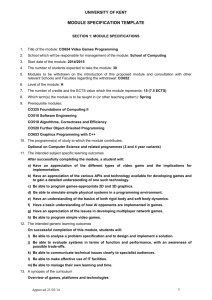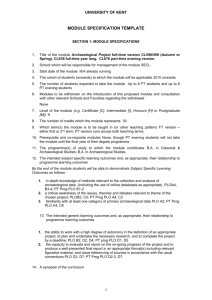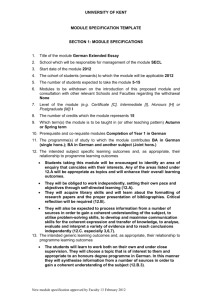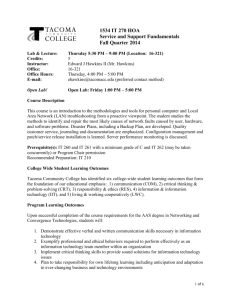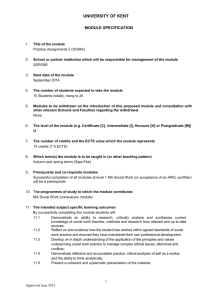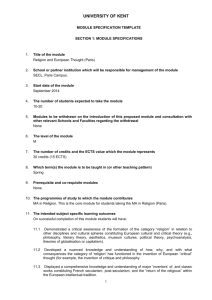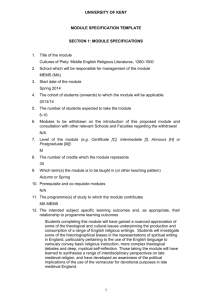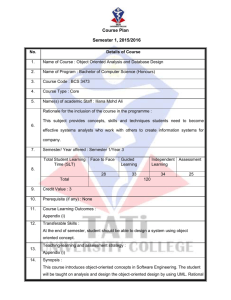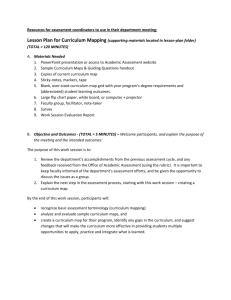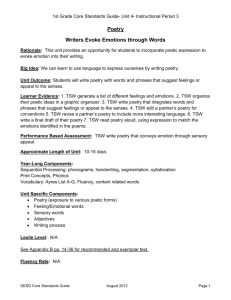Where the module is proposed by a Partner
advertisement
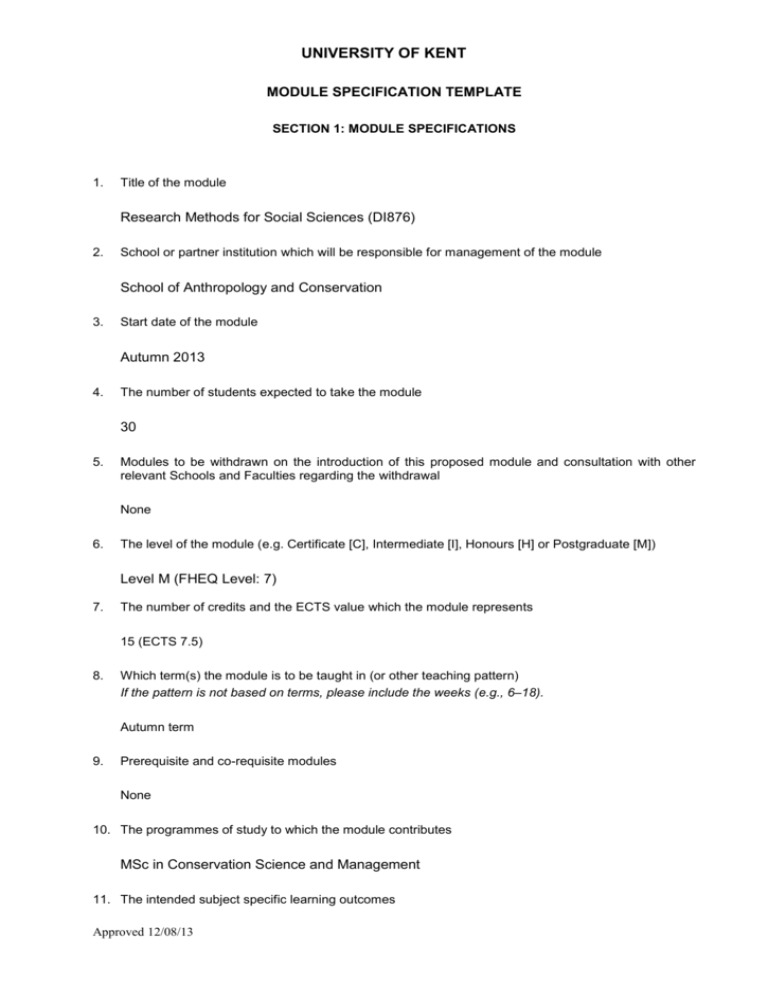
UNIVERSITY OF KENT MODULE SPECIFICATION TEMPLATE SECTION 1: MODULE SPECIFICATIONS 1. Title of the module Research Methods for Social Sciences (DI876) 2. School or partner institution which will be responsible for management of the module School of Anthropology and Conservation 3. Start date of the module Autumn 2013 4. The number of students expected to take the module 30 5. Modules to be withdrawn on the introduction of this proposed module and consultation with other relevant Schools and Faculties regarding the withdrawal None 6. The level of the module (e.g. Certificate [C], Intermediate [I], Honours [H] or Postgraduate [M]) Level M (FHEQ Level: 7) 7. The number of credits and the ECTS value which the module represents 15 (ECTS 7.5) 8. Which term(s) the module is to be taught in (or other teaching pattern) If the pattern is not based on terms, please include the weeks (e.g., 6–18). Autumn term 9. Prerequisite and co-requisite modules None 10. The programmes of study to which the module contributes MSc in Conservation Science and Management 11. The intended subject specific learning outcomes Approved 12/08/13 UNIVERSITY OF KENT Specific learning outcomes 11.1 Understand the principles of different research paradigms, including different strategies and designs and quantitative and qualitative approaches, and the relative merits of each 11.2 Gain skills in basic methodological issues in social science, including response biases, triangulation and sampling, and mixed-methods approaches 11.3 Gain skills in a range of specific methods including qualitative interviewing, focus groups and questionnaires 11.4 Understand the principles of analysis and presentation of qualitative data (through textual narrative, the use of quotations, coding and contingency tables) and quantitative data (through statistical analysis) 11.5 Explore how to present analysed data within the framework of a scientific – or social scientific – report Relationship to programme learning outcomes PLO A3 Fundamental social science perspectives on conservation, and the principles of interdisciplinarity (11.1) PLO A8 Principles of conservation research design, implementation and analysis, including problem-led interdisciplinary approaches (11.1, 11.2, 11.3, 11.4, 11.5) PLO B3 Reflective evaluation of theoretical and methodological frameworks (11.1, 11.5) PLO C2 Social science methodologies (11.1, 11.2, 11.3, 11.4, 11.5) PLO D3 Writing reports and funding proposals (11.5) PLO D8 Independent learning skills required for continuing professional development (11.1, 11.5) 12. The intended generic learning outcomes Generic learning outcomes 12.1 An understanding of how social aspects of conservation research projects need to be designed, analysed and reported Relationship to programme learning outcomes PLO A3 Fundamental social science perspectives on conservation, and the principles of interdisciplinarity (12.1) PLO A8 Principles of conservation research design, implementation and analysis, including problem-led interdisciplinary approaches (12.1) PLO D8 Independent learning skills required for continuing professional development (12.1) Approved 12/08/13 UNIVERSITY OF KENT 13. A synopsis of the curriculum The module will begin with a broad overview of social science approaches to research, highlighting contrasts with standard natural science techniques and focusing on the qualitative-quantitative divide. Subsequent sessions will introduce individual methods such as qualitative interviewing, questionnaire surveys and focus groups. Sessions will also be devoted to processing and analysis of qualitative and quantitative data. Towards the end of the module, we will examine the principles of integrated research design and mixed-methods approaches. 14. Indicative Reading List Bernard R (2005), Research Methods in Anthropology. 4th Edition. Altamira Press. De Vaus DA (2002), Surveys in social research. 5th Edition. Routledge. Newing H, Eagle C, Puri R and Watson C (2009), Conducting research in conservation: social science methods and practice. Taylor and Francis. 15. Learning and Teaching Methods, including the nature and number of contact hours and the total study hours which will be expected of students, and how these relate to achievement of the intended module learning outcomes Learning and teaching methods will consist of weekly workshops consisting of presentations interspersed with discussion sessions and practical group exercises practising individual methods and analysis techniques. As a 15 credit module, total study hours will be approximately 150, of which contact time will be 20 hours. For each workshop, students will be set readings and encouraged to review their class notes and prepare questions for discussion in the following session. They will also be set practical exercises – some to be carried out individually and others in groups - involving practice in using each method. Learning outcome achievement will be monitored informally by observation of class participation, and formally through one exam and one written portfolio on practical data collection and analysis. Workshops: 11.1, 11.2, 11.3, 11.4, 11.5, 12.1 Practical exercises outside workshop sessions: 11.2, 11.3 16. Assessment methods and how these relate to testing achievement of the intended module learning outcomes Approved 12/08/13 UNIVERSITY OF KENT The formal assessment of this module will be through one written 2 hour examination (40%) and one written report presenting the results of an empirical data collection exercise (60%: c. 2500 words). The examination will test knowledge and understanding of different research paradigms and methods, with a particular emphasis on research design and the qualitative – quantitative distinction (11.1, 11.2, 11.4, 12.1). The written report will test practical skills in the use and reporting of specific methods and analysis techniques (11.3, 11.4, 11.5, 12.1). 17. Implications for learning resources, including staff, library, IT and space None 18. The School/Collaborative Partner (delete as applicable) recognises and has embedded the expectations of current disability equality legislation, and supports students with a declared disability or special educational need in its teaching. Within this module we will make reasonable adjustments wherever necessary, including additional or substitute materials, teaching modes or assessment methods for students who have declared and discussed their learning support needs. Arrangements for students with declared disabilities will be made on an individual basis, in consultation with the University’s/Collaborative Partner’s (delete as applicable) disability/dyslexia support service, and specialist support will be provided where needed. As far as can be reasonably anticipated, the curriculum, learning and teaching methods and forms of assessment do not present any non-justifiable disadvantage to students with disabilities. 19. Campus(es) where module will be delivered: Canterbury If the module is part of a programme in a Partner College or Validated Institution, please complete the following: 20. Partner College/Validated Institution: 21. University School responsible for the programme: Approved 12/08/13 UNIVERSITY OF KENT SECTION 2: MODULE IS PART OF A PROGRAMME OF STUDY IN A UNIVERSITY SCHOOL Statement by the School Director of Learning and Teaching/School Director of Graduate Studies (as appropriate): "I confirm I have been consulted on the above module proposal and have given advice on the correct procedures and required content of module proposals" ................................................................ .............................................. Director of Learning and Teaching/Director of Graduate Studies (delete as applicable) Date ………………………………………………… Print Name Statement by the Head of School: "I confirm that the School has approved the introduction of the module and, where the module is proposed by School staff, will be responsible for its resourcing" ................................................................. .............................................. Head of School Date ……………………………………………………. Print Name SECTION 3: MODULE IS PART OF A PROGRAMME IN A PARTNER COLLEGE OR VALIDATED INSTITUTION (Where the module is proposed by a Partner College/Validated Institution) Statement by the Nominated Officer of the College/Validated Institution (delete as applicable): "I confirm that the College/Validated Institution (delete as applicable) has approved the introduction of the module and will be responsible for its resourcing" ................................................................. .............................................. Nominated Responsible Officer of Partner College/Validated Institution Date …………………………………………………. Print Name ………………………………………………….. Post …………………………………………. Partner College/Validated Institution Module Specification Template Last updated February 2013 Approved 12/08/13
